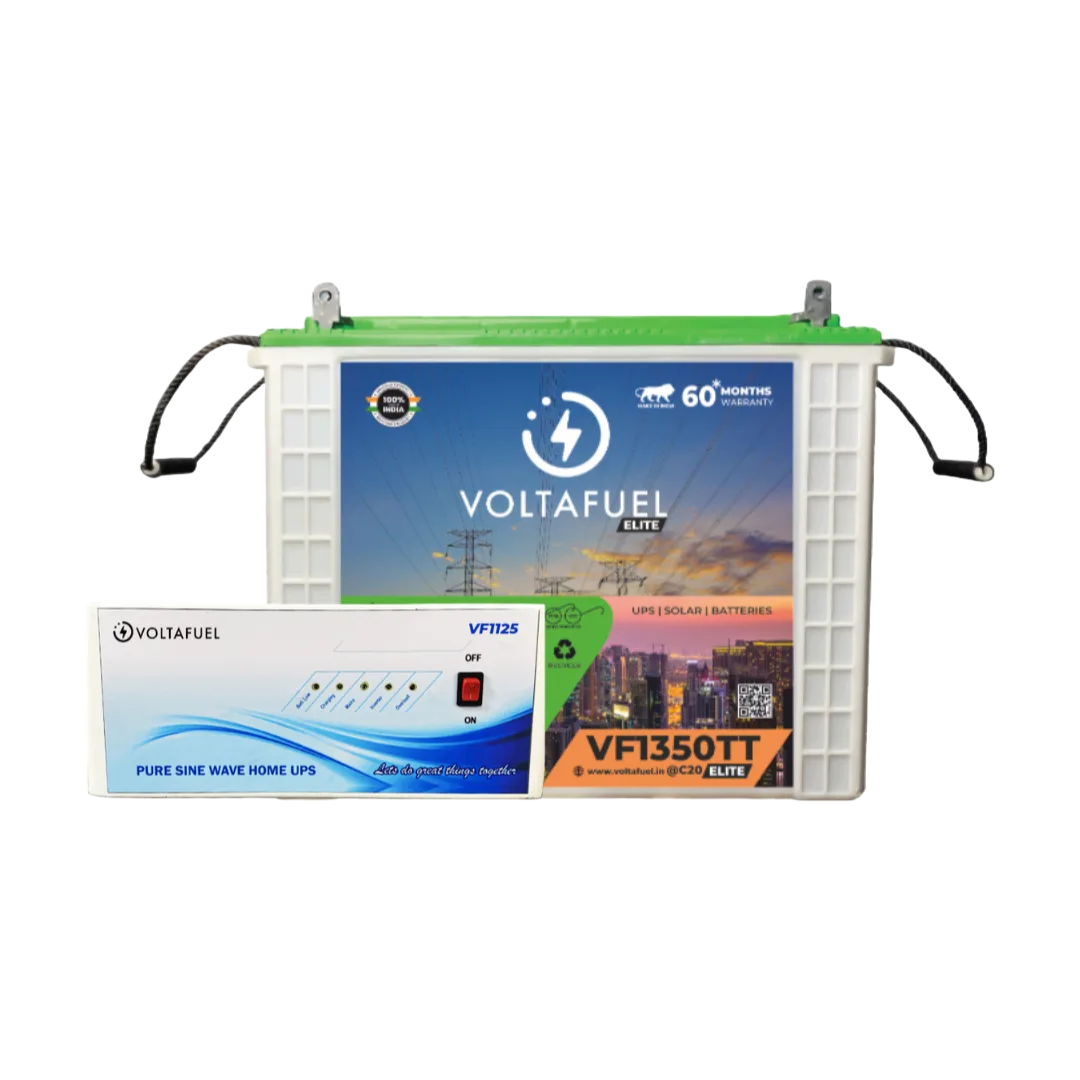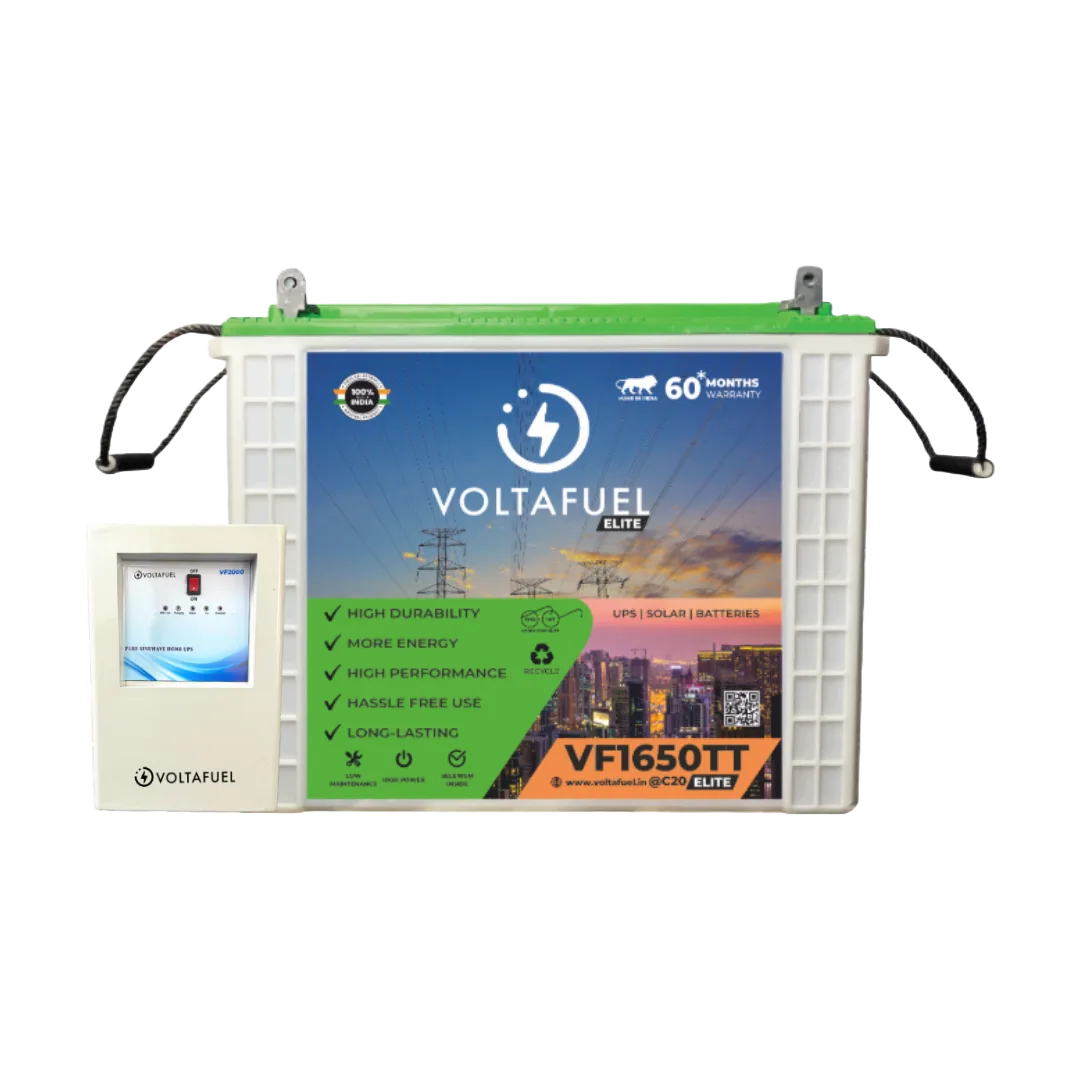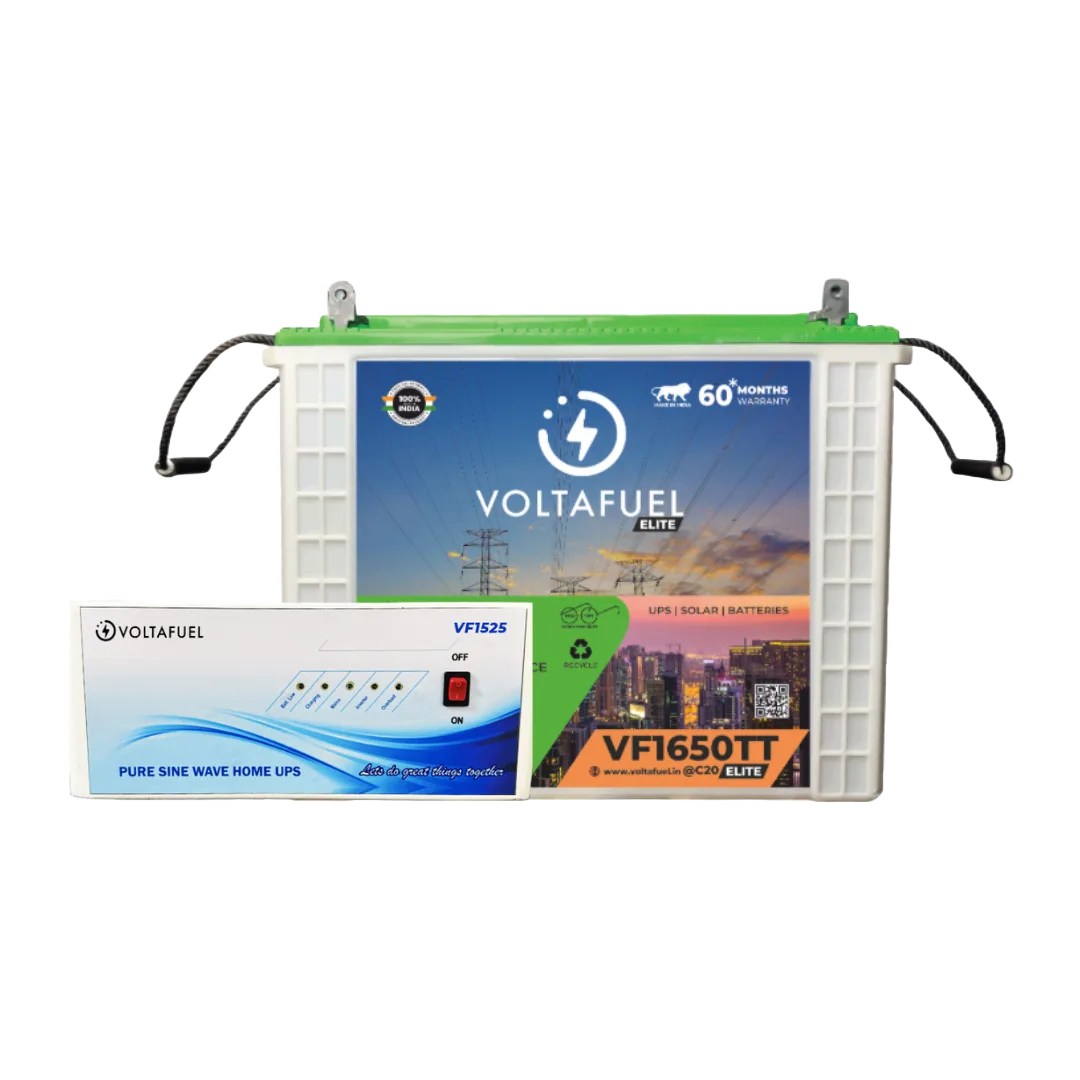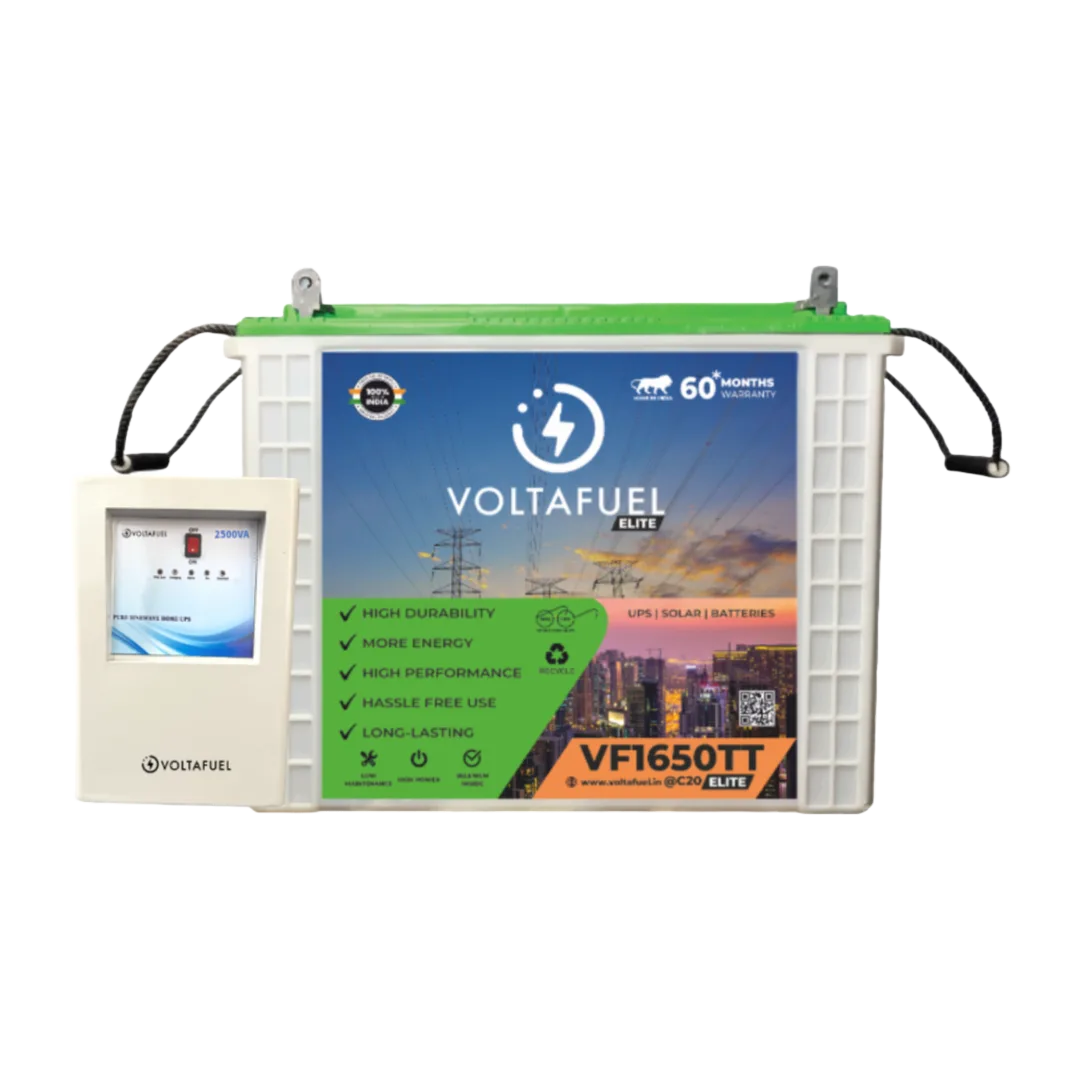Best Voltafuel Inverter For 3 BHK | Home Benefits of Inverter Battery for a 3BHK Home best inverter for home in india 2025
Discover the best inverter for your 3 BHK home, ensuring uninterrupted power supply and optimal performance. Our top recommendations feature advanced technology, energy efficiency, and reliable backup solutions to keep your home running smoothly. Explore durable and user-friendly options tailored to meet the power needs of a modern 3 BHK household.
| Sr.No | Device | Wattage |
|---|---|---|
| 1. | 6 x Plug Sockets | 230 Volt, 6 Amps |
| 2. | 6 x Florescent / LED Lights | 15-25 Watt |
| 3. | 1 x LED TV 64-inch | 60-70 Watt |
| 4. | 3 x Fan | 75W |
| 5. | 2 x Laptop | 60 Watt |
| 6. | 1 x Wifi Router | 25 Watt |
| Total Load | 1940 Watt |
Who needs an inverter battery?
1 x Inverter :- 2500VA/24
2 x Battery :- VF1650TT
Backup Time :- 3 Hours
Notes:-
- 60* Months Battery Warranty
- AMC 1 Year free
- 20ms Switching Time
- Call Now 7×24*
Benefits of Inverter Battery for a 3BHK Home
- Uninterrupted Power Supply: Ensures continuous electricity during power outages.
- Energy Efficiency: Optimizes power usage, reducing electricity bills.
- Appliance Protection: Safeguards home appliances from voltage fluctuations.
- Cost Savings: Lowers the need for frequent maintenance and replacements.
- Eco-Friendly: Reduces carbon footprint by using clean energy.
- Enhanced Convenience: Automatically switches to backup power, ensuring comfort.
- Long Lifespan: Designed for durability and long-term use.
Maintenance Tips: Keeping Your Inverter in Top Condition
Regular Cleaning:
Keep the inverter and battery area clean and dust-free.
Use a dry cloth to wipe off any dust on the surface.
Ventilation:
Ensure proper ventilation around the inverter to prevent overheating.
Avoid placing the inverter in a confined or poorly ventilated space.
Battery Maintenance:
Check the battery water level regularly if you have a lead-acid battery.
Top up with distilled water if necessary.
Clean battery terminals and apply petroleum jelly to prevent corrosion.
Load Management:
Avoid overloading the inverter by connecting more devices than its capacity.
Disconnect unnecessary appliances during power cuts to conserve battery life.
Firmware Updates:
Keep the inverter firmware updated if it has a digital interface.
Check the manufacturer’s website for any updates or improvements.
Periodic Inspections:
Conduct regular inspections for any signs of wear or damage.
Look for loose connections, frayed wires, or unusual noises.
Professional Servicing:
Schedule annual professional servicing to ensure all components are functioning correctly.
Replace any faulty parts as recommended by the technician.
Avoid Over-Discharge:
Do not let the battery discharge completely as it can reduce its lifespan.
Recharge the battery promptly after use.
Temperature Control:
Maintain an optimal temperature for the inverter and battery.
Avoid placing them in areas with extreme temperatures.
Documentation:
Keep the user manual and warranty documents handy.
Follow the manufacturer’s guidelines for maintenance and troubleshooting.
Regular maintenance ensures your inverter runs efficiently, extends its lifespan, and provides reliable power backup when you need it most.
FAQ
Here’s a detailed FAQ on choosing the best inverter for a 3 BHK home:
1.What size inverter is ideal for a 3 BHK home?
Answer: A 3 BHK home typically requires an inverter with a capacity of 1500 VA to 2000 VA. This size can support basic appliances such as lights, fans, and a few electronic devices. If you need to power heavier appliances like air conditioners or refrigerators, you may need an inverter with a higher capacity.
2. Which type of battery is best for an inverter?
Answer: Tubular batteries are usually the best choice for inverters in homes due to their longer life, better efficiency, and ability to withstand long power outages. They require less maintenance compared to flat plate batteries and have a longer service life (around 5-7 years).
3. What is the difference between a pure sine wave inverter and a modified sine wave inverter?
Answer: A pure sine wave inverter provides electricity that closely mimics the grid power, making it suitable for sensitive electronic devices like laptops, TVs, and refrigerators. A modified sine wave inverter is less expensive but may cause a buzzing sound in devices and is not recommended for sensitive electronics.
4. How many appliances can I run on a 1500 VA inverter?
Answer: A 1500 VA inverter can typically support:
– 8-10 LED/CFL bulbs
– 3-4 ceiling fans
– 1 TV or small refrigerator
If you add more high-power-consuming devices, like microwaves or washing machines, you’ll need a higher-capacity inverter.
5. How do I calculate my power requirements for an inverter?
Answer: Calculate your total load by adding the power consumption (in watts) of all the appliances you want to run during a power cut. For example:
– 1 Fan = 75 W
– 1 LED light = 10 W
– 1 TV = 120 W
Total power requirement = 75 + 10 + 120 = 205 W. Add up all appliances similarly to find the total wattage, then choose an inverter with appropriate capacity (convert watts to VA by dividing by 0.8, the efficiency factor).
6. What is the best inverter brand for a 3 BHK home?
Answer: Some of the top-rated inverter brands in India include Luminous, Microtek, Exide, V-Guard, and Su-Kam. These brands are known for reliability, durability, and good after-sales service.
7. How long will the inverter run on battery backup?
Answer: Battery backup time depends on the battery capacity (AH) and the load. For example, a 150 Ah battery on a 1000 W load may last for around 2-3 hours. Larger capacity batteries provide longer backup, so choose according to your home’s power consumption needs.
8. Can I run air conditioners or refrigerators on my inverter?
Answer: Yes, but you need a higher capacity inverter and batteries to support heavy-load appliances. For a refrigerator, a minimum of 2kVA inverter is suggested, and for an air conditioner, you may need a 3.5-4kVA inverter along with higher Ah batteries.
9. How often should I maintain my inverter and batteries?
Answer: Regular maintenance is essential to ensure your inverter and batteries perform optimally. For tubular batteries, it’s important to check the water levels every 3-6 months and top up if needed. Also, ensure the inverter is installed in a dust-free and well-ventilated area.
10. Is a solar inverter suitable for a 3 BHK home?
Answer: Yes, solar inverters are an eco-friendly option and can help reduce electricity bills. For a 3 BHK home, you can install a hybrid inverter that works both on solar energy and the grid. The inverter should be chosen based on your load and solar panel capacity.
11. What safety features should I look for in an inverter?
Answer: Look for inverters that offer safety features like:
– Overload protection
– Battery deep discharge protection
– Short-circuit protection
– Overcharging protection
– Auto-reset in case of overload
12. Can I install an inverter on my own?
Answer: While it’s possible to install a small inverter yourself, it is recommended to have a qualified technician install it. They ensure proper connections, safety precautions, and placement to avoid any issues like short-circuiting or overloading.
13. How much does an inverter and battery setup cost for a 3 BHK home?
Answer: The cost varies depending on the inverter capacity and battery size. On average, a good quality inverter (1500 VA) and battery (150-200 Ah) setup may cost around ₹15,000 to ₹30,000. For higher capacity inverters and solar options, the cost may increase.
14. How does warranty work for inverters and batteries?
Answer: Most inverters come with a warranty period of 2-3 years, while batteries may have a warranty ranging from 3-5 years, depending on the brand. Always check the terms and conditions of the warranty, and ensure it covers both replacement and service.
15. How do I choose between a standard inverter and a solar inverter?
Answer: Choose a standard inverter if your area doesn’t have much sunlight or you’re not planning to invest in solar panels. If you’re looking to reduce electricity costs and have good sunlight exposure, opt for a solar inverter, which can utilize solar power to charge the batteries and run your home.
Customer asked Question
1. What is the best size inverter for a house?
The best inverter size for a house depends on your power needs. For small to medium homes, a 1000 VA to 1500 VA inverter can handle basic appliances like lights, fans, and a TV. Larger homes or those with heavy appliances (AC, refrigerators) may require a 2000 VA or higher inverter.
2. Which inverter is sufficient for a home?
A 1500 VA pure sine wave inverter is generally sufficient for most homes, powering essential appliances like lights, fans, and a TV. If your home has heavy appliances like refrigerators or air conditioners, a 2000 VA or higher inverter with a large-capacity battery would be more appropriate.
3. Which is the best inverter for 2 bedroom flat?
For a 2-bedroom flat, a 1000 VA to 1500 VA pure sine wave inverter is ideal, providing sufficient power for basic appliances like lights, fans, and a TV. Brands like Luminous, Microtek, and V-Guard offer reliable options with efficient performance and good backup, making them great choices.
4. Power Backup Solution for 3 BHK Home
For a 3 BHK home, a 1500 VA to 2000 VA pure sine wave inverter with 150-200 Ah tubular batteries provides a solid power backup solution. It can run essential appliances like fans, lights, and TVs. For heavier loads like air conditioners or refrigerators, opt for higher capacity.
5. Best Inverters For Home in India 2025
In 2025, some of the best inverters for homes in India include Luminous Zelio+ 1700, Microtek UPS 24×7 HB, V-Guard Prime 1150, and Exide 1500VA Pure Sinewave. These models offer reliable performance, long battery life, and pure sine wave output, ideal for powering essential appliances.
6. Best inverter with battery for home
The Luminous Zelio+ 1700 with an ILTT 18048 150Ah tubular battery is one of the best inverter-battery combos for home use. It offers excellent performance, reliable power backup, and a pure sine wave output, making it ideal for running essential appliances with longer battery life and low maintenance.
7. Best heavy duty inverter for home ?
For heavy-duty power needs, the Luminous Cruze 2KVA/24V inverter is an excellent choice. Paired with high-capacity tubular batteries (e.g., 200Ah), it efficiently powers heavy appliances like air conditioners, refrigerators, and washing machines. Its pure sine wave output ensures stable performance and long-lasting backup for large homes.
When choosing the best inverter for your home in India in 2025, prioritize efficiency, durability, and features. Top brands like Voltafuel, Luminous, V-Guard, and Microtek offer reliable inverters with advanced technologies like pure sine wave output and solar compatibility. Ensure proper capacity calculation for seamless power backup tailored to your needs.
best inverter for 1 bhk flat
-
 Add to WishlistRemove from WishlistAdd to Wishlist
Add to WishlistRemove from WishlistAdd to Wishlist -
 Add to WishlistRemove from WishlistAdd to Wishlist
Add to WishlistRemove from WishlistAdd to Wishlist -
 Add to WishlistRemove from WishlistAdd to Wishlist
Add to WishlistRemove from WishlistAdd to Wishlist



